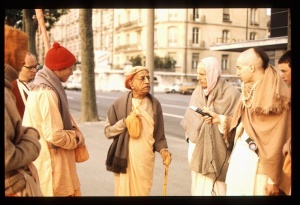SB 8.10.30-31: Difference between revisions
m (1 revision(s)) |
(Vanibot #0054 edit - transform synonyms into clickable links, which search similar occurrences) |
||
| (One intermediate revision by one other user not shown) | |||
| Line 1: | Line 1: | ||
{{info | {{info | ||
|speaker= | |speaker=Śukadeva Gosvāmī | ||
|listener=King | |listener=King Parīkṣit | ||
}} | }} | ||
[[Category:Srimad-Bhagavatam - Canto 08 Chapter 10]] | |||
[[Category:Bhagavatam Verses Spoken by Sukadeva Gosvami - Vanisource|081030]] | |||
<div style="float:left">'''[[Srimad-Bhagavatam]] - [[SB 8|Eighth Canto]] - [[SB 8.10: The Battle Between the Demigods and the Demons|Chapter 10: The Battle Between the Demigods and the Demons]]'''</div> | |||
<div style="float:right">[[File:Go-previous.png|link=SB 8.10.29]] '''[[SB 8.10.29]] - [[SB 8.10.32-34]]''' [[File:Go-next.png|link=SB 8.10.32-34]]</div> | |||
{{RandomImage}} | |||
==== TEXTS 30-31 ==== | ==== TEXTS 30-31 ==== | ||
<div | <div class="verse"> | ||
aparājitena namucir | :aparājitena namucir | ||
aśvinau vṛṣaparvaṇā | :aśvinau vṛṣaparvaṇā | ||
sūryo bali-sutair devo | :sūryo bali-sutair devo | ||
bāṇa-jyeṣṭhaiḥ śatena ca | :bāṇa-jyeṣṭhaiḥ śatena ca | ||
rāhuṇā ca tathā somaḥ | |||
pulomnā yuyudhe 'nilaḥ | :rāhuṇā ca tathā somaḥ | ||
niśumbha-śumbhayor devī | :pulomnā yuyudhe 'nilaḥ | ||
bhadrakālī tarasvinī | :niśumbha-śumbhayor devī | ||
:bhadrakālī tarasvinī | |||
</div> | </div> | ||
| Line 21: | Line 27: | ||
==== SYNONYMS ==== | ==== SYNONYMS ==== | ||
<div | <div class="synonyms"> | ||
''[//vanipedia.org/wiki/Special:VaniSearch?s=aparājitena&tab=syno_o&ds=1 aparājitena]'' — with the demigod Aparājita; ''[//vanipedia.org/wiki/Special:VaniSearch?s=namuciḥ&tab=syno_o&ds=1 namuciḥ]'' — the demon Namuci; ''[//vanipedia.org/wiki/Special:VaniSearch?s=aśvinau&tab=syno_o&ds=1 aśvinau]'' — the Aśvinī brothers; ''[//vanipedia.org/wiki/Special:VaniSearch?s=vṛṣaparvaṇā&tab=syno_o&ds=1 vṛṣaparvaṇā]'' — with the demon Vṛṣaparvā; ''[//vanipedia.org/wiki/Special:VaniSearch?s=sūryaḥ&tab=syno_o&ds=1 sūryaḥ]'' — the sun-god; ''[//vanipedia.org/wiki/Special:VaniSearch?s=bali&tab=syno_o&ds=1 bali]-[//vanipedia.org/wiki/Special:VaniSearch?s=sutaiḥ&tab=syno_o&ds=1 sutaiḥ]'' — with the sons of Bali; ''[//vanipedia.org/wiki/Special:VaniSearch?s=devaḥ&tab=syno_o&ds=1 devaḥ]'' — the god; ''[//vanipedia.org/wiki/Special:VaniSearch?s=bāṇa&tab=syno_o&ds=1 bāṇa]-[//vanipedia.org/wiki/Special:VaniSearch?s=jyeṣṭhaiḥ&tab=syno_o&ds=1 jyeṣṭhaiḥ]'' — the chief of whom is Bāṇa; ''[//vanipedia.org/wiki/Special:VaniSearch?s=śatena&tab=syno_o&ds=1 śatena]'' — numbering one hundred; ''[//vanipedia.org/wiki/Special:VaniSearch?s=ca&tab=syno_o&ds=1 ca]'' — and; ''[//vanipedia.org/wiki/Special:VaniSearch?s=rāhuṇā&tab=syno_o&ds=1 rāhuṇā]'' — by Rāhu; ''[//vanipedia.org/wiki/Special:VaniSearch?s=ca&tab=syno_o&ds=1 ca]'' — also; ''[//vanipedia.org/wiki/Special:VaniSearch?s=tathā&tab=syno_o&ds=1 tathā]'' — as well as; ''[//vanipedia.org/wiki/Special:VaniSearch?s=somaḥ&tab=syno_o&ds=1 somaḥ]'' — the moon-god; ''[//vanipedia.org/wiki/Special:VaniSearch?s=pulomnā&tab=syno_o&ds=1 pulomnā]'' — Puloma; ''[//vanipedia.org/wiki/Special:VaniSearch?s=yuyudhe&tab=syno_o&ds=1 yuyudhe]'' — fought; ''[//vanipedia.org/wiki/Special:VaniSearch?s=anilaḥ&tab=syno_o&ds=1 anilaḥ]'' — the demigod Anila, who controls air; ''[//vanipedia.org/wiki/Special:VaniSearch?s=niśumbha&tab=syno_o&ds=1 niśumbha]'' — the demon Niśumbha; ''[//vanipedia.org/wiki/Special:VaniSearch?s=śumbhayoḥ&tab=syno_o&ds=1 śumbhayoḥ]'' — with Śumbha; ''[//vanipedia.org/wiki/Special:VaniSearch?s=devī&tab=syno_o&ds=1 devī]'' — the goddess Durgā; ''[//vanipedia.org/wiki/Special:VaniSearch?s=bhadrakālī&tab=syno_o&ds=1 bhadrakālī]'' — Bhadra Kālī; ''[//vanipedia.org/wiki/Special:VaniSearch?s=tarasvinī&tab=syno_o&ds=1 tarasvinī]'' — extremely powerful. | |||
</div> | </div> | ||
| Line 28: | Line 34: | ||
==== TRANSLATION ==== | ==== TRANSLATION ==== | ||
<div | <div class="translation"> | ||
The demigod Aparājita fought with Namuci, and the two Aśvinī-kumāra brothers fought with Vṛṣaparvā. The sun-god fought with the one hundred sons of Mahārāja Bali, headed by Bāṇa, and the moon-god fought with Rāhu. The demigod controlling air fought with Puloma, and Śumbha and Niśumbha fought the supremely powerful material energy, Durgādevī, who is called Bhadra Kālī. | The demigod Aparājita fought with Namuci, and the two Aśvinī-kumāra brothers fought with Vṛṣaparvā. The sun-god fought with the one hundred sons of Mahārāja Bali, headed by Bāṇa, and the moon-god fought with Rāhu. The demigod controlling air fought with Puloma, and Śumbha and Niśumbha fought the supremely powerful material energy, Durgādevī, who is called Bhadra Kālī. | ||
</div> | </div> | ||
__NOTOC__ | |||
<div style="float:right; clear:both;">[[File:Go-previous.png|link=SB 8.10.29]] '''[[SB 8.10.29]] - [[SB 8.10.32-34]]''' [[File:Go-next.png|link=SB 8.10.32-34]]</div> | |||
__NOTOC__ | |||
__NOEDITSECTION__ | |||
Latest revision as of 23:11, 18 February 2024

A.C. Bhaktivedanta Swami Prabhupada
TEXTS 30-31
- aparājitena namucir
- aśvinau vṛṣaparvaṇā
- sūryo bali-sutair devo
- bāṇa-jyeṣṭhaiḥ śatena ca
- rāhuṇā ca tathā somaḥ
- pulomnā yuyudhe 'nilaḥ
- niśumbha-śumbhayor devī
- bhadrakālī tarasvinī
SYNONYMS
aparājitena — with the demigod Aparājita; namuciḥ — the demon Namuci; aśvinau — the Aśvinī brothers; vṛṣaparvaṇā — with the demon Vṛṣaparvā; sūryaḥ — the sun-god; bali-sutaiḥ — with the sons of Bali; devaḥ — the god; bāṇa-jyeṣṭhaiḥ — the chief of whom is Bāṇa; śatena — numbering one hundred; ca — and; rāhuṇā — by Rāhu; ca — also; tathā — as well as; somaḥ — the moon-god; pulomnā — Puloma; yuyudhe — fought; anilaḥ — the demigod Anila, who controls air; niśumbha — the demon Niśumbha; śumbhayoḥ — with Śumbha; devī — the goddess Durgā; bhadrakālī — Bhadra Kālī; tarasvinī — extremely powerful.
TRANSLATION
The demigod Aparājita fought with Namuci, and the two Aśvinī-kumāra brothers fought with Vṛṣaparvā. The sun-god fought with the one hundred sons of Mahārāja Bali, headed by Bāṇa, and the moon-god fought with Rāhu. The demigod controlling air fought with Puloma, and Śumbha and Niśumbha fought the supremely powerful material energy, Durgādevī, who is called Bhadra Kālī.